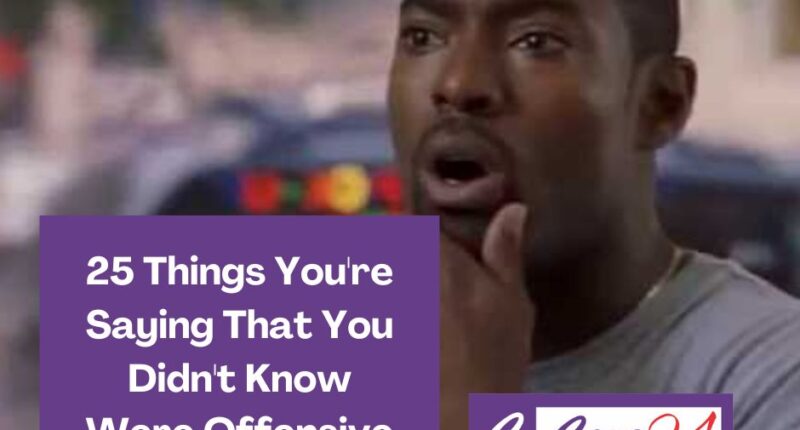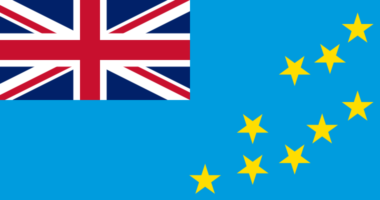Let’s take a look at “25 Things You’re Saying That You Didn’t Know Were Offensive” It’s easy to get caught up in our own worlds and the way we think things should be. We might not even realize that the things we’re saying could be offensive to others.
In this article, we’ll take a look at 25 common phrases that you might not know are offensive, and how to avoid them in the future.

Here are 25 Things You’re Saying That You Didn’t Know Were Offensive
Table of Contents
- 1 Spaz
- 2 Peanut gallery
- 3 Cannibal
- 4 Hooligans
- 5 Mumbo jumbo
- 6 Fuzzy wuzzy
- 7 No can do
- 8 Basket case
- 9 Moron
- 10 Rule of thumb
- 11 Eeny, meeny, miny, moe
- 12 Eskimo
- 13 Drink the Kool-Aid
- 14 Long time no see
- 15 Cat got your tongue
- 16 Hysteria
- 17 Tipping point
- 18 Boy
- 19 Off the reservation
- 20 Spinster
- 21 Call a spade a spade
- 22 Grandfathered in
- 23 Sold down the river
- 24 Gypsy or “Gyp”
- 25 Welfare Queen
- 26 Final Note
Spaz
Many people believe that using the word “spastic” to describe someone is just as disrespectful as using the R-word. The word’s link with cerebral palsy, a condition once known as spastic paralysis, is what causes the stigma. The 100 Slang Terms From the 20th Century No One Uses Anymore has more terms you haven’t heard in a while.
Peanut gallery
If you’re using the term “peanut gallery” to describe someone who is being disruptive or voicing their opinion in a negative way, you might want to rethink that. The term actually has a very offensive history.
The term “peanut gallery” comes from vaudeville theaters in the early 1900s. These theaters had a section of the audience that was reserved for African American people. This section was often located near the back of the theater, and it was referred to as the “peanut gallery” because peanuts were often sold there.
The use of the term “peanut gallery” to describe someone who is being disruptive or voicing their opinion in a negative way is deeply rooted in racism. It’s best to avoid using this term altogether.
Cannibal
When most people think about cannibalism, they probably don’t see the Caribbean (instead, they might picture a bloodied Anthony Hopkins). However, the Canibales, or Caribs, a West Indian tribe, are the source of the phrase. This ancient tribe supposedly had a reputation for eating one another.
Hooligans
1. Hooligans: This term is used to describe rowdy or violent young people, but it can be seen as offensive because it associates young people with negative behaviors.
2. Thug: This term is often used to describe criminals or people who engage in violence, but it can be seen as offensive because it associates these activities with a particular race or ethnicity.
3. Idiot: This term is used to describe someone who is foolish or stupid, but it can be seen as offensive because it implies that the person is not smart enough to understand what they are doing.
4. Crazy: This term is used to describe someone who is acting erratically or irrational, but it can be seen as offensive because it implies that the person is not in control of their actions.
5. Loser: This term is used to describe someone who has failed at something or who is not successful, but it can be seen as offensive because it implies that the person is not good enough to be successful.
Mumbo jumbo
The West African deity Maamajomboo is most likely where the term “mumbo jumbo” originates. Why is it objectionable? It seems that Mandinka men would pretend to be gods to settle household disputes and mistreat their wives.
Fuzzy wuzzy
Fuzzy Before becoming a bear, Wuzzy wasn’t always so innocent. Due to their dark skin and curly hair, British colonial soldiers in the 1800s called the members of an East African nomadic tribe “fuzzy wuzzies.” Later, other military organizations adopted the phrase to describe other indigenous people in nations like Papa New Guinea and Sudan.
No can do
When you say “no can do,” you might think you’re just indicating that you’re unable to do something. However, this phrase can actually be offensive to some people.
The phrase “no can do” is derived from Chinese Pidgin English, a form of English that was used by Chinese laborers in the 1800s. At that time, the use of Chinese Pidgin English was considered to be very disrespectful. Today, some people still consider the use of this phrase to be disrespectful.
If you want to avoid offending anyone, it’s best to avoid using the phrase “no can do.” There are plenty of other ways to indicate that you’re unable to do something. For example, you could say “I’m sorry, but I can’t do that.”
Basket case
This idiom for a person who struggles to cope first appeared during World War I to depict a person who needed to be carried in a basket after losing all four of their limbs.
Moron
The term “moron” was originally a psychological diagnosis for a mild handicap rather than an insult.
Rule of thumb
You might not know this, but the phrase “rule of thumb” is actually quite offensive. The phrase is derived from an old English law that said a man could beat his wife with a stick as long as it was no thicker than his thumb. Obviously, this is a very outdated and sexist view of marriage, and so using the phrase “rule of thumb” can be seen as endorsing violence against women.
If you want to avoid offending people, it’s best to steer clear of this phrase. There are plenty of other ways to express the same idea without using a term that has such a dark history.
Eeny, meeny, miny, moe
You may not realize it, but if you use the phrase “eeny, meeny, miny, moe” you could be offending someone. This is because the phrase has a history of being used as a racist slur. The original version of the phrase was “eeny, meeny, miny, moe, catch a n***** by his toe.” As you can see, the word “n*****” is a racial slur that is used to refer to black people.
Over time, the phrase has been changed to be less offensive. However, even the newer versions of the phrase can still be offensive to some people. For example, some people might find it offensive if you use the word “monkey” instead of “n*****.”
If you want to avoid offending anyone, it’s best to avoid using this phrase altogether. There are plenty of other ways to count without using words that could be seen as offensive.
Eskimo
1. Eskimo – Some people believe that the term “Eskimo” is a derogatory word used to describe indigenous peoples of the Arctic. The term actually comes from the Inuit language, and it simply means “people.” However, some people still find the term offensive, so it’s best to avoid using it.
2. Gypsy – The term “gypsy” is often used to describe people who are nomadic or who have a lifestyle that is different from the mainstream. However, the term is actually derived from the Romani people, who are an ethnic group with a long history of persecution. As a result, many Roma people find the term offensive and prefer to be called by their own name.
3. Native American – The term “Native American” is used to describe the indigenous peoples of the Americas. However, some people believe that the term is too general and does not properly represent the diversity of cultures within this group. Additionally, some Native Americans find the term offensive because it was imposed on them by colonizers.
Drink the Kool-Aid
1. Drinking the Kool-Aid is a phrase that is often used to describe someone who blindly follows a group or leader. However, the phrase actually has a dark origin. It comes from the Jonestown massacre, in which over 900 people died after drinking poison. The phrase is now considered to be offensive and should be avoided.
2. Another phrase that you may be using without realizing it is “that’s so gay.” This phrase is often used to describe something that is bad or stupid. However, it is considered to be offensive to the LGBTQ+ community. Try using a different word instead, such as “That’s so dumb.”
3. Another common phrase that is actually quite offensive is “I’m not racist, but…” This phrase is often used by people who want to make it clear that they are not racist. However, the fact that they feel the need to specify that they are not racist suggests that they may have some racist tendencies. It’s best to just avoid this phrase altogether.
4. Finally, a phrase that you might use without realizing it is ” Native Americans should just get over it.” This phrase is insensitive to the history of violence and oppression that Native Americans have faced. It’s best to avoid this phrase and be respectful of the history and culture of Native Americans.
Long time no see
1. Long time no see
You might think that this phrase is innocuous, but it can actually be quite offensive. The reason is that it implies that you haven’t seen the person in a long time, which can make them feel like you don’t care about them or their life. It’s best to avoid this phrase altogether.
2. That’s so gay
This phrase is often used as a way to describe something that is bad or negative. However, it is offensive to the LGBTQ community because it implies that being gay is bad. It’s best to avoid using this phrase.
3. That’s retarded
This phrase is often used to describe something that is stupid or foolish. However, it is offensive to people with disabilities because it implies that they are stupid or foolish. It’s best to avoid using this phrase.
Cat got your tongue
The phrase “cat got your tongue” is often used when someone is feeling shy or nervous. However, this phrase is actually offensive. It originated in medieval times when people believed that if you were struck dumb, it was because a cat had stolen your tongue. This belief was based on the fact that cats are known for being very quiet creatures.
Today, the phrase “cat got your tongue” is considered to be offensive because it implies that someone who is feeling shy or nervous is stupid. It also perpetuates the false belief that cats can steal tongues. If you want to avoid offending someone, it’s best to avoid using this phrase.
Hysteria
1. Hysteria
The word “hysteria” has been used to describe women for centuries. It comes from the Greek word for uterus, and it was used to describe any kind of illness or disorder that was thought to be caused by the uterus. Today, the word is still used to describe women who are said to be overly emotional or irrational. This usage is offensive because it implies that women are not as capable as men of controlling their emotions and making rational decisions.
2. Bitch
The word “bitch” is a derogatory term used to describe a woman who is perceived as being difficult or unpleasant. This usage is offensive because it implies that women are somehow lesser than men and that they should be treated with disrespect.
3. Crazy
The word “crazy” is often used to describe people who are behaving erratically or who seem to be out of control. While this usage isn’t specifically directed at women, it is often used in a way that suggests that women are more likely to be “crazy” than men. This usage is offensive because it perpetuates the stereotype that women are emotionally unstable and incapable of rationality.
Tipping point
1. Tipping point: The tipping point is when the waiter brings the bill to the table and you’re expected to leave a tip. However, many people don’t realize that the tipping point is also when you’re expected to give a compliment to the chef. Saying something like “The food was great, but I didn’t like the service” is considered offensive.
2. “That’s so gay”: This phrase is often used to describe something that’s not good or desirable. However, it’s also considered offensive because it implies that being gay is bad or undesirable.
3. “That’s so retarded”: Like “that’s so gay,” this phrase is often used to describe something that’s not good or desirable. However, it’s also considered offensive because it implies that having a mental disability is bad or undesirable.
4. “You guys”: This phrase is commonly used to address a group of people, but it can be offensive because it excludes women and implies that all men are friends.
5. “Man up”: This phrase is often used to encourage someone to be brave or strong in the face of adversity. However, it can be offensive because it implies that men are always brave and
Boy
You might not think that the word “boy” is offensive, but it can be seen as a derogatory term when used to refer to a grown man. The word “boy” implies that the person is immature or childish. It can also be seen as a way of belittling someone.
If you need to refer to a grown man, it’s best to use terms like “man”, “guy”, or “dude”. These words are more neutral and won’t offend anyone.
Off the reservation
If you’re not Native American, it’s best to avoid using the phrase “off the reservation.” This phrase is often used to describe someone who is acting out of line or out of control. However, it can be seen as offensive to Native Americans because it implies that they are not in control of their own lives.
So, if you’re not Native American, it’s best to avoid using this phrase. If you need to describe someone who is acting out of line, you can use other phrases such as “out of control” or “out of bounds.”
Spinster
The term “spinster” is often used to describe an unmarried woman. However, the term is actually quite offensive. The word “spinster” comes from the word “spinning,” which was traditionally a woman’s job. Thus, the term “spinster” implies that an unmarried woman is nothing more than a woman who hasn’t been able to find a husband. This is clearly offensive and demeaning.
Another term that is often used to describe an unmarried woman is “old maid.” This term is also quite offensive. It implies that an unmarried woman is past her prime and will never find a husband. This is clearly untrue and offensive.
It’s important to be aware of the terms that are used to describe unmarried women. These terms are often offensive and demeaning. The use of these terms should be avoided.
Call a spade a spade
You would be wrong to believe that this idiom, which means to “tell it like it is,” refers to a gardening tool or a deck of cards. The phrase “to call a fig a fig and a trough a trough” from ancient Greek language has variations that date back to 120 A.D. However, it acquired a racist connotation during the Harlem Renaissance in the 1920s, when calling someone a “spade” was a racial epithet. The term is listed as a derogatory slang word alongside many other awful names in the fourth edition of The American Language by author H.L. Mencken, which was released in 1948.
Grandfathered in
You might not know this, but saying that someone is “grandfathered in” to a job or a benefits package can be offensive. This phrase implies that the person is old and no longer relevant. It also suggests that the person is no longer able to compete with younger, more qualified candidates.
If you need to refer to someone who is receiving benefits or has a job because they were hired before a certain date, it’s best to use the phrase “grandfather clause.” This phrase is less offensive and doesn’t have the same negative connotations.
Sold down the river
If you’re not careful, you might accidentally say something that is offensive without meaning to. For example, the phrase “sold down the river” is often used to describe someone who has been betrayed. However, this phrase has a very dark history. It comes from the days of slavery, when slave owners would literally sell slaves down the river to other slave owners. As you can imagine, this was a terrible experience for the slaves involved. So, if you use this phrase, you might unintentionally offend someone who is aware of its history.
Another phrase that you might want to avoid is “gypped.” This word comes from the Romani word for “thief.” The Romani people are an ethnic group that has faced a lot of discrimination over the years. So, using this word can be seen as offensive.
Finally, you should be careful when using the word “crazy.” This word is often used to describe someone who is acting erratically or behaving in a strange way. However, it can also be used as a derogatory term for people with mental illness. So, if you use it in this way, you could end up offending someone.
Overall, it’s important to be careful about the words you use. Some words might have offensive histories that you’re not aware of. Others might be seen as derogatory terms for groups of people. So, it’s always best to err on the side of caution and avoid using these types of words altogether.
Gypsy or “Gyp”
1. Gypsy or “Gyp”
The word “gypsy” is considered to be a derogatory term when used to refer to members of the Romani people. The term is believed to be derived from the word “Egyptian”, and was used to describe the nomadic lifestyle of the Romani people. The word “gyp” is also considered to be offensive, and is thought to be a shortened version of the word “gypsy”.
Welfare Queen
The term “welfare queen” is a racist and offensive term that is used to describe a black woman who is receiving welfare benefits. The term implies that the woman is lazy and undeserving of the benefits. It also reinforces the false stereotype that black women are more likely to be on welfare than other women.
The term “welfare queen” is offensive and should not be used. It is important to be aware of the implications of the terms we use. When we use offensive terms like this, we are perpetuating harmful stereotypes and reinforcing racism.
Final Note
It’s important to be aware of the things you say that may be offensive to others, even if you don’t mean them to be. This is especially true in a workplace setting, where you need to be careful not to accidentally offend your coworkers or boss. By being conscious of the words and phrases you use, you can avoid any potential conflict and create a more positive work environment for everyone.









